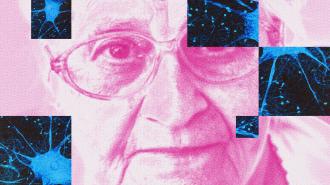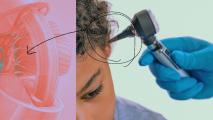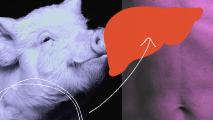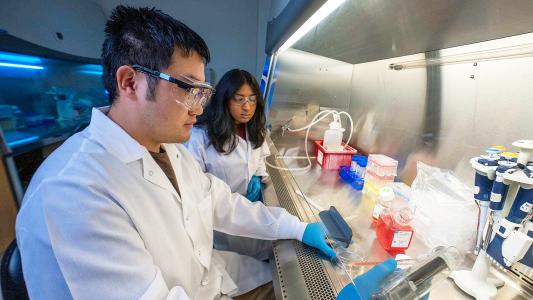Rare mutation may counteract “Alzheimer’s gene”
By studying a rare mutation linked to Alzheimer’s, Stanford researchers have discovered new evidence supporting the use of CRISPR gene editing to treat the devastating disease.
The challenge: There are very few ways to slow down Alzheimer’s disease or treat its symptoms, and there’s no cure — in 2021, nearly 120,000 Americans died from Alzheimer’s complications, making it one of the top 10 leading causes of death.
One genetic variant in particular — called APOE-e4 — is strongly tied to the brain disease. Having one copy makes a person 2-3 times more likely to develop Alzheimer’s, while having two copies (one from each parent) increases the risk by 8-12 times.
This makes APOE-e4 one of the most promising leads in the hunt for an Alzheimer’s cure, but researchers aren’t exactly sure how the variant contributes to the disease — and two different theories have very different implications.
“Knocking down APOE might mean less risk of Alzheimer’s, but you might affect your heart or your blood vessels.”
Tara Spires-Jones
One possibility is that the protein made by the APOE-e4 variant is somehow abnormal and causes Alzheimer’s directly, suggesting that using CRISPR to turn it off could prevent the disease. Studies in mice and human “mini brains” are showing promise — but knocking out the gene in people could have unforeseen consequences.
“[The APOE protein is] important for things like bringing cholesterol to your neurons,” Tara Spires-Jones, an Alzheimer’s researcher at the University of Edinburgh, told New Scientist. “Knocking down APOE might mean less risk of Alzheimer’s, but you might affect your heart or your blood vessels.”
Another possibility is that the protein made by the APOE-e4 variant is just not as good as other variants at doing something important, like clearing amyloid (a hallmark of Alzheimer’s) from the brain.
But if that’s how APOE-e4 causes Alzheimer’s, that implies something very different — instead of knocking out the gene, to get rid of the bad protein, you’d want to design medications to make up for its shortcomings.
What’s new? Stanford researchers have now shared a study on the preprint server arXiv that supports the case for reducing the expression of APOE-e4.
They analyzed 36,000 human genomes in the Alzheimer’s Disease Sequencing Project database looking for people with a “loss-of-function” mutation in the APOE-e4 gene. This kind of natural mutation reduces the function of the gene, similar to what researchers might want to try doing with CRISPR.
“The results … support knockdown of APOE-e4 or its protein product as a viable therapeutic option.”
Chemparathy et al.
They discovered two such people. One was 79 years old with normal cognitive function, and the other died over the age of 90 with normal cognitive function — and no sign of amyloid plaques in their brain.
“The results provide the strongest human genetics evidence yet available suggesting that e4 drives [Alzheimer’s] risk through a gain of abnormal function and support knockdown of APOE-e4 or its protein product as a viable therapeutic option,” the researchers wrote.
Looking ahead: Having APOE-e4 doesn’t automatically doom someone to developing Alzheimer’s, and a sample size of two isn’t large enough to draw firm conclusions about how a loss-of-function mutation might affect the risk of Alzheimer’s (or potential side effects of not having enough APOE elsewhere in the body).
Still, this study was a clever way to see how reducing the expression of the APOE-e4 gene could affect Alzheimer’s, without having to actually administer a gene therapy to a person — nature did the gene editing for us. With this as a guide, researchers can start moving forward to test this approach experimentally.
We’d love to hear from you! If you have a comment about this article or if you have a tip for a future Freethink story, please email us at [email protected].






